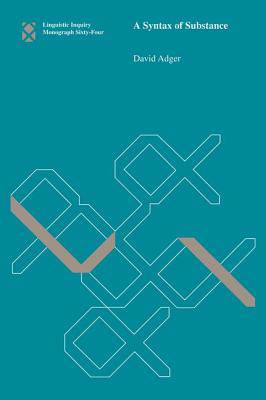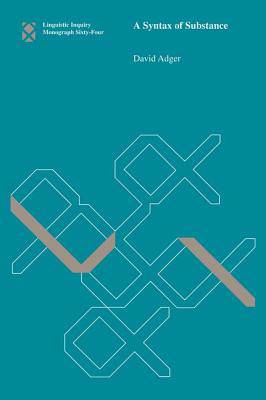
- Afhalen na 1 uur in een winkel met voorraad
- Gratis thuislevering in België vanaf € 30
- Ruim aanbod met 7 miljoen producten
- Afhalen na 1 uur in een winkel met voorraad
- Gratis thuislevering in België vanaf € 30
- Ruim aanbod met 7 miljoen producten
Omschrijving
In A Syntax of Substance, David Adger proposes a new approach to phrase structure that eschews functional heads and labels structures exocentrically. His proposal simultaneously simplifies the syntactic system and restricts the range of possible structures, ruling out the ubiquitous (remnant) roll-up derivations and forcing a separation of arguments from their apparent heads. This new system has a number of empirical consequences, which Adger explores in the domain of relational nominals across different language families, including Germanic, Romance, Celtic, Polynesian, and Semitic. He shows that the relationality of such nouns as hand, edge, or mother -- which seem to have as part of their meaning a relation between substances -- is actually part of the syntactic representation in which they are used rather than an inherent part of their meaning. This empirical outcome follows directly from the new syntactic system, as does a novel analysis of PP complements to nouns and possessors. Given this, he argues that nouns can, in general, be thought of as simply specifications of substance, differentiating them from true predicates.
A Syntax of Substance offers an innovative contribution to debates in theoretical syntax about the nature of syntactic representations and how they connect to semantic interpretation and linear order.
Specificaties
Betrokkenen
- Auteur(s):
- Uitgeverij:
Inhoud
- Aantal bladzijden:
- 208
- Taal:
- Engels
- Reeks:
- Reeksnummer:
- nr. 64
Eigenschappen
- Productcode (EAN):
- 9780262018616
- Verschijningsdatum:
- 4/01/2013
- Uitvoering:
- Hardcover
- Formaat:
- Genaaid
- Afmetingen:
- 155 mm x 231 mm
- Gewicht:
- 430 g

Alleen bij Standaard Boekhandel
Beoordelingen
We publiceren alleen reviews die voldoen aan de voorwaarden voor reviews. Bekijk onze voorwaarden voor reviews.











